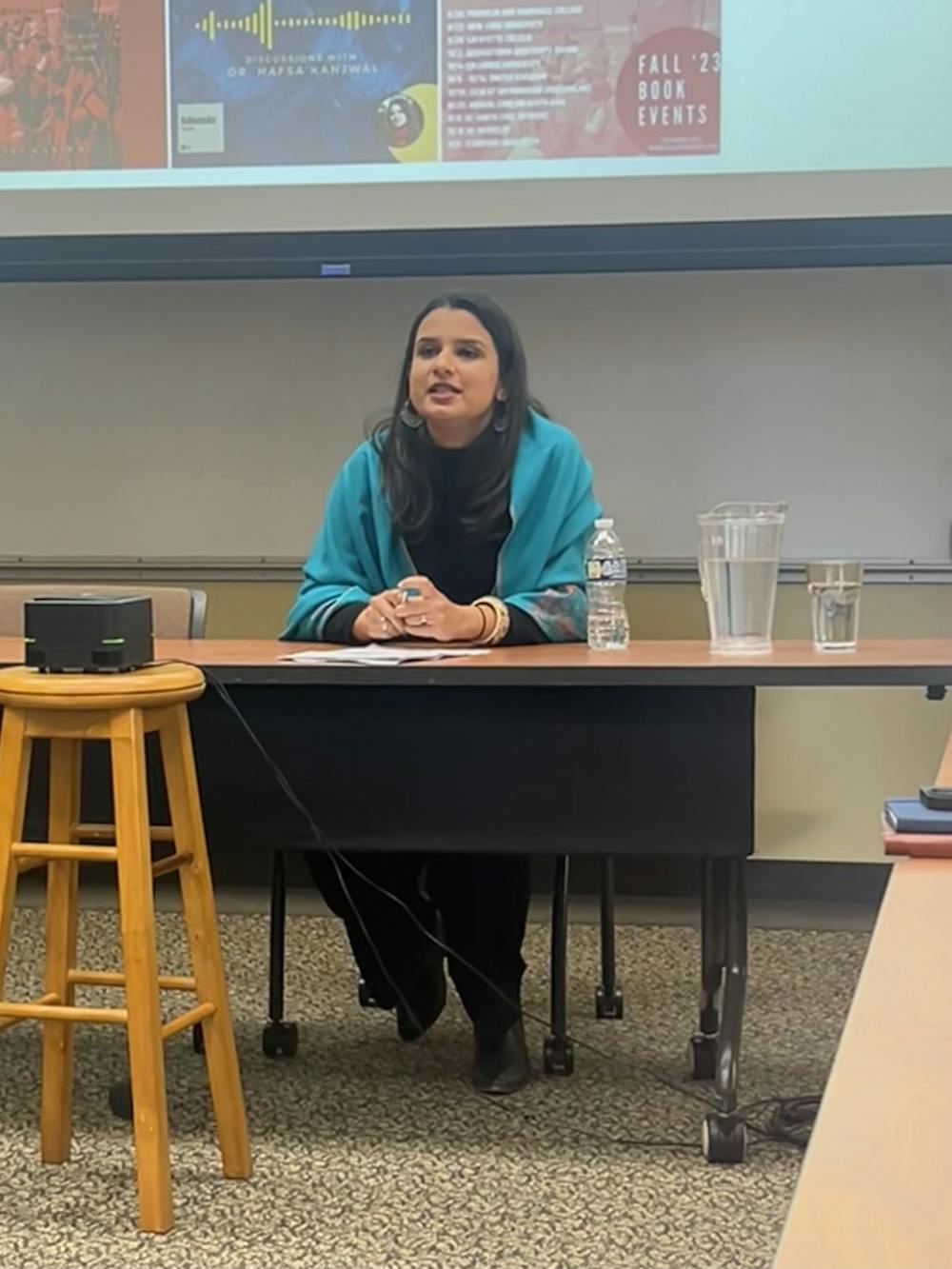Notre Dame hosted Lafayette College assistant professor and author Hafsa Kanjwal on Tuesday afternoon to for a lecture and Q&A session regarding her newly released book, “Colonizing Kashmir: State-Building under Indian Occupation.” Sponsored by the Initiative on Race and Resilience at Notre Dame and the Liu Institute's South Asia group, Kanjwal spoke to a room full of students, professors and community members at the Hesburgh Center.
An expert on South Asian history, Kanjwal has spoken about her research to several news outlets including the BBC and The Washington Post.
Kanjwal focuses on the political, economic and social tensions and consequences of India’s occupation of Kashmir in the 1950s and 1960s in her book, focusing on Bakshi Ghulam Mohammad’s policies as Prime Minister of Jammu and Kashmir between 1953 and 1964.
“There remains an attachment in scholarship, especially in South Asia, to seeing colonialism as emerging only from the west to the Global South and situating our present moment as a decolonial one. This approach fails to account for power dynamics within the global South, such as that between India and Kashmir, as well as the ways in which post-colonial nation states can also be colonial,” Kanjwal said.
Background
For a brief background, the region in which Kashmir is located has been disputed between Pakistan and India since India's independence from Britain in 1947. The first of several Indo-Pakistani wars took place because of disputed claims over Kashmir. A line of control was drawn by the United Nations in 1949, and the region was told to vote on whether Pakistan or India would occupy their region. This plebiscite never happened.
According to Kanjwal, India implemented Article 370 into their national constitution, which temporarily allowed Kashmir to have its own constitution and law-making body. By this point in 1949, India’s only concerns with Kashmir were handling communications, defense and foreign affairs — to give the illusion of national autonomy. However, Kashmir’s first Prime Minister Sheikh Abdullah was soon overthrown by India’s government and replaced by Bakshi in 1953 and tasked with promoting assimilation with India and repressing popular political aspirations to merge with Pakistan. Under Bakshi’s rule, Kashmir’s government strived for assimilation with the Indian Union, “undermining Kashmir’s autonomy,” according to Kanjwal.
Colonizing Kashmir
This set the stage for what Kanjal discusses in her book: propaganda, strategic political policy and client regime used to create an illusion of dependency and choice of assimilation for the Kashmiri people.
“The dominant narrative about this period, both to a certain extent in popular memory but also in scholarship is that things were normal during this time…But I argue that it is precisely through the ruse of stakeholding that India colonized Kashmir. The decade Bakshi was in power consolidated Pakistan and India’s occupations by relying on those very same discourses and practices of development, secularism, integration, mobilization and democracy,” Kanjwal said.
Through various examples and perspectives of interviewed Kashmiris, Kanjwal continued to explain the subtle and propagandizing methods used by India’s government to create a “malleable” group of “subjects.” Her points made during the lecture derived from her extensive studies during this period of time in Kashmir derived from her book, where each were better explored in their respective chapter.
Reactions
Manaal Buchh, a sophomore, is the daughter of two Kashmiris. She attended the lecture and appreciated that a spotlight was put on Kashmir.
“There’s not very many Kashmiris in America, and so this exposure had me giddy for a while,” Buchh said. “I’ve just never seen any talk on Kashmir at any university. It’s really rare to see anything like this.”
Buchh viewed the lecture as an opportunity to understand the Kashmir occupation from an intellectual lens and compare it with the personal experiences of her parents and grandparents.
“I think sometimes when you look at things from an intellectual perspective, it's really difficult to understand how recently all of this is happening…I'm constantly surrounded by reminders that this isn't something that's an abstract concept. It's something that's very much real and alive today. And it's something that's still impacting my family here and in Kashmir,” Buchh said. “...I guess from a daughter’s point of view. I feel it's very much a duty (for me) to record everything and absorb everything as humanly possible so that it's not slipping through the cracks.”
Sophomore Fatima Attia attended the lecture with Buchh and had first learned of Kashmir from her. Attia believed the lecture was an important way for the campus to become more aware of the current state of Kashmir and what’s led to this point.
To Attia, the biggest takeaway was "how unaware most individuals, me included, are about the situations in Kashmir. The fact that this is a reality for them, and you cannot fully appreciate a culture and recognize the beautiful parts of it without considering the pain and difficulty that comes with it."
She added that authoritarianism makes political expression difficult.
“It was insightful and obviously alarming just how hard it is to get the people of Kashmir to even speak about what is happening because of the danger that exists within it,” she said. “That was something I was unaware of, and I think awareness is a big part of it, because how will this already relatively un-talked about topic continue to gain and rise in information and education if no one is willing to speak?”










